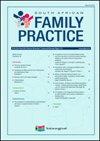A qualitative study of pharmacists’ perceptions and awareness of homoeopathic medicines in Durban, South Africa
IF 1.2
Q2 MEDICINE, GENERAL & INTERNAL
引用次数: 0
Abstract
Background: There is growing interest in the demand for and use of homoeopathic medicines by the public; however, little is known about the perspectives of pharmacists regarding the use of these medicines, particularly in the South African private health context.Methods: A qualitative approach using an exploratory cross-sectional descriptive design was used. Data were collected from a purposive sample of 15 participants comprising pharmacy managers, pharmacists and pharmacy assistants from six different conveniently selected private pharmacy retail outlets. Data were collected using individual interviews utilising a semi-structured interview guide. An audiotape was used to record the data which were transcribed verbatim and analysed thematically, following Tech’s steps of data analysis. Ethical approval to conduct the study was obtained from the Durban University of Technology’s Institutional Research Ethics Committee.Results: The findings of this study revealed four superordinate themes related to pharmacists’ perceptions and self-reported awareness regarding homoeopathic medicines. These are (1) negative perceptions regarding homoeopathic medicines, (2) perceived benefits of homoeopathic medicines, (3) poor knowledge and awareness of homoeopathic medicines and (4) capacity development and curriculum aspects.Conclusion: The findings highlight the need for an educational intervention on homoeopathic medicines targeting pre-service and in-service pharmacy practitioners, to enable them to provide effective education regarding all types of medicines as the demand for homoeopathic medicines increases.Contribution: The study findings provide evidence to support advocacy for an educational intervention to improve awareness and knowledge of pharmacists to enable provision of effective health education for patients. More research, however, is required to inform the contents of this training intervention for pharmacists.关于南非德班药剂师对同种疗法药物的看法和认识的定性研究
背景:公众对同种疗法药物的需求和使用越来越感兴趣;然而,人们对药剂师使用这些药物的看法却知之甚少,尤其是在南非私营医疗机构中:采用探索性横截面描述设计的定性方法。从方便挑选的 6 家不同的私营药店零售点的药店经理、药剂师和药店助理等 15 名参与者中进行有目的的抽样调查,收集数据。数据收集采用了半结构化访谈指南,以个别访谈的方式进行。我们使用录音带记录数据,并按照 Tech 的数据分析步骤逐字转录和进行主题分析。德班理工大学的机构研究伦理委员会批准了本研究的进行:研究结果表明,药剂师对同种疗法药物的看法和自我报告的认识有四个基本主题。这些主题是:(1)对同种疗法药物的负面看法;(2)对同种疗法药物益处的看法;(3)对同种疗法药物缺乏了解和认识;(4)能力发展和课程方面:研究结果突出表明,随着对同种疗法药物需求的增加,有必要针对职前和在职药剂师开展同种疗法药物的教育干预活动,使他们能够就所有类型的药物提供有效的教育:研究结果为宣传教育干预措施提供了证据,以提高药剂师的意识和知识,从而为患者提供有效的健康教育。不过,还需要开展更多研究,为药剂师培训干预措施的内容提供依据。
本文章由计算机程序翻译,如有差异,请以英文原文为准。
求助全文
约1分钟内获得全文
求助全文
来源期刊

South African Family Practice
MEDICINE, GENERAL & INTERNAL-
CiteScore
1.50
自引率
20.00%
发文量
79
审稿时长
25 weeks
期刊介绍:
South African Family Practice (SAFP) is a peer-reviewed scientific journal, which strives to provide primary care physicians and researchers with a broad range of scholarly work in the disciplines of Family Medicine, Primary Health Care, Rural Medicine, District Health and other related fields. SAFP publishes original research, clinical reviews, and pertinent commentary that advance the knowledge base of these disciplines. The content of SAFP is designed to reflect and support further development of the broad basis of these disciplines through original research and critical review of evidence in important clinical areas; as well as to provide practitioners with continuing professional development material.
 求助内容:
求助内容: 应助结果提醒方式:
应助结果提醒方式:


